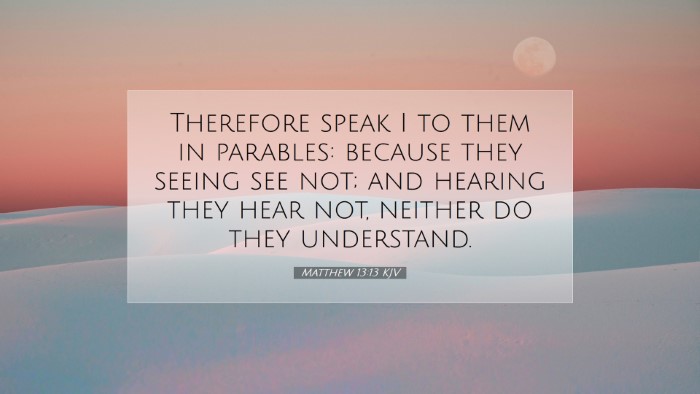Commentary on Matthew 13:13
Bible Verse: "Therefore speak I to them in parables: because they seeing see not; and hearing they hear not, neither do they understand."
Introduction
This verse forms part of Jesus' response regarding His use of parables in teaching the crowds. Public domain commentaries by notable theologians such as Matthew Henry, Albert Barnes, and Adam Clarke provide profound insights into the complexities of this passage, enriching our understanding of its context and implications for the listeners then and now.
Contextual Analysis
The chapter begins with Jesus teaching by the Sea of Galilee, where He shares the Parable of the Sower. The use of parables serves a dual purpose: to convey truth to the sincere seeker and to conceal it from those who are indifferent to spiritual truths. The context indicates a deepening separation between believers and skeptics, encapsulated in Jesus' statement in verse 13.
Exegesis of Matthew 13:13
- “Therefore speak I to them in parables”: This indicates a deliberate choice by Jesus, showcasing His pedagogical method. Matthew Henry notes that parables were not merely illustrative; they served a strategic purpose in His teaching.
- “because they seeing see not”: The phrase underlines a spiritual blindness. Albert Barnes comments that the superficial observation of events without spiritual insight typifies the religious leaders of the time.
- “and hearing they hear not”: Adam Clarke emphasizes that the inability to comprehend divine truths stems from a hardened heart. God's truth can be perceived, yet the unwillingness to accept it leads to an inability to hear.
- “neither do they understand”: This conclusion captures the essence of spiritual blindness. The audience, though physically present, is mentally and spiritually disengaged. According to Matthew Henry, understanding is a gift that requires openness to God's wisdom.
Theological Implications
Jesus' teaching method unveils a profound theological theme regarding the nature of divine revelation and human reception. The notion that some truths are hidden from the wise yet revealed to the humble serves as a reminder that spiritual insight is a gift bestowed upon those who earnestly seek and accept it.
The Purpose of Parables
The use of parables was not a technique to obfuscate truth, but rather to engage the hearts of listeners. Jesus illustrates deep spiritual realities through relatable stories, compelling individuals to ponder and engage with divine mystery. Albert Barnes asserts that parables provoke thought, allowing listeners to draw closer to understanding by their own reflections.
The Reality of Spiritual Blindness
Mental and spiritual blindness becomes a significant topic here. This identification of spiritual hard-heartedness speaks not only to the Jewish leaders of the day but continues to resonate with contemporary audiences who may encounter the gospel with indifference. Matthew Henry writes of these individuals as being ‘in the world, but not of it,’ where they are physically present but spiritually absent.
Special Revelation vs General Revelation
This verse raises questions about God's revelation to humanity. While all of creation reveals God's attributes (Romans 1:20), specific truths about God's kingdom are accessible only through a relationship with Him. Adam Clarke articulates this duality, highlighting that a mere observer of nature cannot grasp the spiritual truths that require a measure of heart readiness.
Application for Today
As we examine Matthew 13:13, it falls upon pastors, students, and scholars to weigh the call to humility and readiness in receiving God's word. Recognizing the barriers of pride and skepticism can lead to a deeper, more authentic relationship with the truths of the kingdom of heaven.
The Need for Humility
- Seek and You Shall Find: Emphasizing a heart posture that desires to understand.
- Engagement with Scripture: Regular and reflective reading of God's word as a means to combat spiritual blindness.
- Community Learning: Engaging with others in community settings to explore parables' meanings together.
Encouragement for Pastors and Teachers
Pastors and teachers are challenged to present divine truths clearly and effectively while also recognizing that not every listener will respond. Utilizing engaging methods, such as storytelling, should be balanced with a call to earnest reflection. The objective is not mere information transfer but facilitating a deeper understanding of God's message.
The Role of the Holy Spirit
Ultimately, the process of understanding spiritual truths hinges upon the work of the Holy Spirit. As emphasized in numerous commentaries, reliance on the Spirit for discernment is crucial in revealing truths that would otherwise remain hidden.
Conclusion
Matthew 13:13 serves as a poignant reminder of the relationship between observation and understanding in the context of spiritual truth. As we reflect upon the words of Jesus and the insights provided by Henry, Barnes, and Clarke, we are encouraged to approach God's word with humility, seeking a deeper and more substantial understanding of the parables that illuminate His kingdom.


